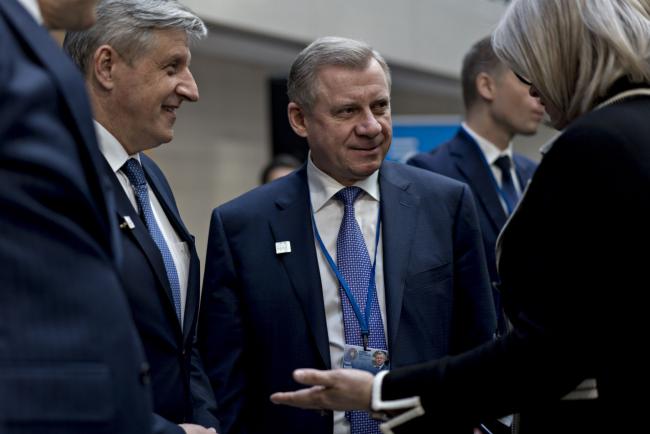
The shock departure late Wednesday came just as the debt was being priced, with the hryvnia and existing Eurobonds plunging when they opened for trading on Thursday. The news also coincides with rising Covid-19 infections in the eastern European country and follows the agreement just weeks ago on $5 billion of aid from the International Monetary Fund.
Ukrainian President Volodymyr Zelenskiy sought to reassure markets Thursday but to little avail. The hryvnia weakened 1.3% to its lowest level against the dollar since April and the yield on the government’s dollar bonds due 2028 jumped 33 basis points to 7.42%.
“Ensuring the central bank’s independence remains our priority,” Zelenskiy’s office said.
The words will also be scant comfort to Governor Yakiv Smoliy, who’s complained for months about pressure — including from Zelenskiy and his lawmakers — to lower interest rates and aid exporters by facilitating a weaker national currency.
Some members of his ruling party have even sided with billionaire Igor Kolomoisky’s efforts to overturn the central bank-led nationalization of the country’s biggest lender, Privatbank, four years ago.
“For a long time, systematic political pressure was applied to the central bank,” said Smoliy, who was appointed in 2018 and is widely respected by foreign investors. “This makes it impossible for me to efficiently fulfill my duty as governor and to cooperate with other government bodies.”
His exit was accepted by Zelenskiy, who must also pick a successor, and now needs to be approved by parliament. The central bank said the rest of its board would remain in place.
Smoliy, who joined the bank in 2014 after Ukraine toppled its Kremlin-backed leader, is credited for helping tame inflation, keep the hryvnia stable through the pandemic and negotiate the recent IMF deal. He oversaw a reduction in benchmark borrowing costs to a post-communist low last month.
‘Important Strides’
“Under his leadership, Ukraine has made important strides in achieving price stability, amply demonstrating that an independent central bank is a key element of modern macroeconomic policy-making,” the IMF said.
While the departure increased uncertainty and raised questions about the bank’s independence and the IMF program, investors will “forget fast” if Smoliy’s replacement is market friendly, according to Anton Hauser, a fund manager at Erste Asset Management in Vienna who participated in the pulled deal and said he’ll want to take part when it’s reinstated.
“The overall positive trajectory in Ukraine, the high global-risk appetite and the low yield environment will support Ukrainian bonds going forward,” he said.
Central banks around the world have faced increasing political pressure in recent years to adopt policies that are more friendly to economic growth. Before the pandemic, U.S. President Donald Trump regularly chided Federal Reserve Chairman Jerome Powell over monetary policy. Turkish President Recep Tayyip Erdogan ousted his central bank chief in 2019 for not lowering interest rates aggressively enough.
In Ukraine, Smoliy isn’t the first governor to face pressure. Protesters hounded his predecessor, Valeriya Gontareva, who on one occasion saw a coffin containing a cutout of her wearing a prison inmate’s uniform delivered to the central bank’s headquarters. She also alleges Kolomoisky burned down her family home in Kyiv, which he denies.
The bank accused the tycoon in November of orchestrating an intimidation campaign through public demonstrations and negative media coverage in a bid to win back control of Privatbank.
“I want my resignation to be a warning against further attempts to undermine institutional grounds of central bank in Ukraine,” Smoliy said.
(Updates with investor after ‘Important Strides’ subheadline.)
©2020 Bloomberg L.P.



